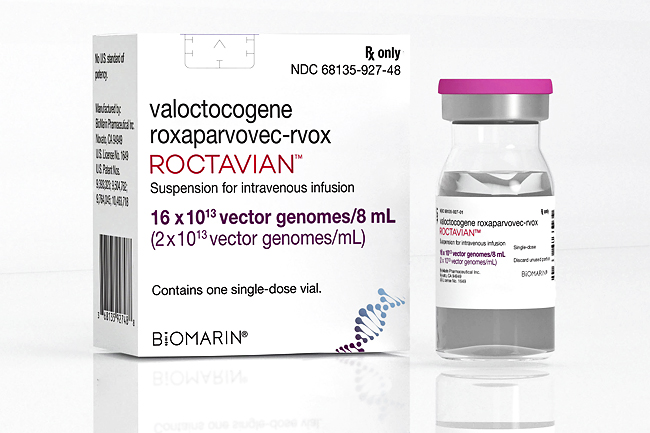WASHINGTON (AP) – United States (US) officials on Thursday approved drugmaker BioMarin’s gene therapy for the most common form of haemophilia, a USD2.9 million infused treatment that can significantly reduce dangerous bleeding problems.
The Food and Drug Administration (FDA) approved Roctavian for adult patients with severe cases of haemophilia A, the inherited blood-clotting disorder that can lead to bleeding after minor injuries or scrapes. It’s the first gene therapy for those patients.
The IV therapy is a long-awaited alternative to current treatments, including weekly doses of a protein needed to help blood clot.
Some patients take a newer, longer-acting biotech drug that replaces the protein.
BioMarin said in a statement that the FDA approval was based on a three-year study showing a 50-per-cent reduction in annual bleeding incidents among 134 patients who received the treatment. Most patients continued to respond to the treatment beyond three years, without needing regular IV infusions, the company said.
BioMarin said Roctavian’s USD2.9 million price tag reflects “the possibility of freedom from years” of infusions, which cost about USD800,000 annually for a typical patient. The price is less than the USD3.5 million announced last year for a similar gene therapy for haemophilia B, a less common form of the disease.
Like most medicines in the US, the new treatment will mainly be paid for by insurers, not patients.
BioMarin said it estimates about 2,500 US patients will be eligible to receive the therapy under the terms of the FDA’s approval. Patients with certain underlying health problems and conditions are excluded under the prescribing information.

Haemophilia is caused by mutations that prevent the production of proteins needed for blood clotting. Haemophilia A is the most severe variant of the condition, and some patients can experience spontaneous bleeding even without any injury. Left untreated, the condition can cause bleeding that seeps into joints and organs, including the brain.
Roctavian uses an inactivated virus, created in a lab, to deliver a replacement gene to the liver cells that produce the clotting protein. When the therapy is successful, patients can then produce the protein themselves.
The label warns that rare, severe allergic reactions can occur.
Dr Margaret Ragni called Roctavian “a major improvement in terms of reducing the burden of disease”. But she notes that many patients are comfortable with their current treatments and may be hesitant to try a new gene therapy.
“I think there’s a group that will want to do this, but patients need to hear what the risks and benefits are,” said Ragni, who treats patients at the Haemophilia Center of Western of Pennsylvania in Pittsburgh.
BioMarin was among the first companies to begin testing an experimental gene therapy in patients more than six years ago.
The San Rafael, California-based company excluded patients with certain potentially complicating conditions, including liver disorders and resistance to the standard blood clotting protein, which often develops in some haemophilia patients. BioMarin’s president for research and development, Dr Henry Fuchs, said the company is conducting studies in some of those excluded groups to see if they can safely receive the therapy.
Another key question is how long the therapy’s benefits last. BioMarin has followed the patients for more than three years and they continue to experience reduced bleeding.
But levels of the clotting protein in the bloodstream fall over time, suggesting additional treatments may eventually be needed.






